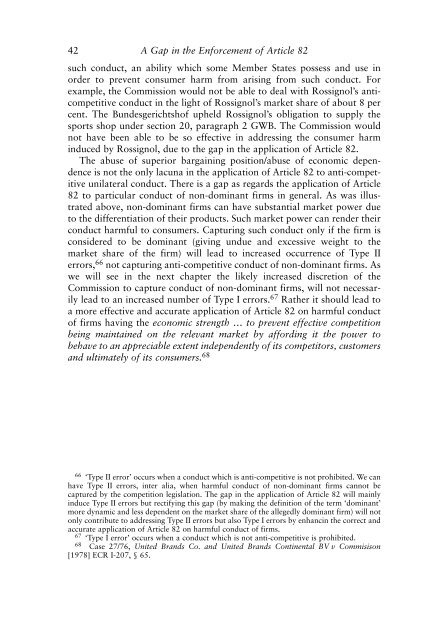Abuse of Economic Dependence - The Centre for European Policy ...
Abuse of Economic Dependence - The Centre for European Policy ...
Abuse of Economic Dependence - The Centre for European Policy ...
Create successful ePaper yourself
Turn your PDF publications into a flip-book with our unique Google optimized e-Paper software.
42 A Gap in the En<strong>for</strong>cement <strong>of</strong> Article 82<br />
such conduct, an ability which some Member States possess and use in<br />
order to prevent consumer harm from arising from such conduct. For<br />
example, the Commission would not be able to deal with Rossignol’s anticompetitive<br />
conduct in the light <strong>of</strong> Rossignol’s market share <strong>of</strong> about 8 per<br />
cent. <strong>The</strong> Bundesgerichtsh<strong>of</strong> upheld Rossignol’s obligation to supply the<br />
sports shop under section 20, paragraph 2 GWB. <strong>The</strong> Commission would<br />
not have been able to be so effective in addressing the consumer harm<br />
induced by Rossignol, due to the gap in the application <strong>of</strong> Article 82.<br />
<strong>The</strong> abuse <strong>of</strong> superior bargaining position/abuse <strong>of</strong> economic dependence<br />
is not the only lacuna in the application <strong>of</strong> Article 82 to anti-competitive<br />
unilateral conduct. <strong>The</strong>re is a gap as regards the application <strong>of</strong> Article<br />
82 to particular conduct <strong>of</strong> non-dominant firms in general. As was illustrated<br />
above, non-dominant firms can have substantial market power due<br />
to the differentiation <strong>of</strong> their products. Such market power can render their<br />
conduct harmful to consumers. Capturing such conduct only if the firm is<br />
considered to be dominant (giving undue and excessive weight to the<br />
market share <strong>of</strong> the firm) will lead to increased occurrence <strong>of</strong> Type II<br />
errors, 66 not capturing anti-competitive conduct <strong>of</strong> non-dominant firms. As<br />
we will see in the next chapter the likely increased discretion <strong>of</strong> the<br />
Commission to capture conduct <strong>of</strong> non-dominant firms, will not necessarily<br />
lead to an increased number <strong>of</strong> Type I errors. 67 Rather it should lead to<br />
a more effective and accurate application <strong>of</strong> Article 82 on harmful conduct<br />
<strong>of</strong> firms having the economic strength … to prevent effective competition<br />
being maintained on the relevant market by af<strong>for</strong>ding it the power to<br />
behave to an appreciable extent independently <strong>of</strong> its competitors, customers<br />
and ultimately <strong>of</strong> its consumers. 68<br />
66 ‘Type II error’ occurs when a conduct which is anti-competitive is not prohibited. We can<br />
have Type II errors, inter alia, when harmful conduct <strong>of</strong> non-dominant firms cannot be<br />
captured by the competition legislation. <strong>The</strong> gap in the application <strong>of</strong> Article 82 will mainly<br />
induce Type II errors but rectifying this gap (by making the definition <strong>of</strong> the term ‘dominant’<br />
more dynamic and less dependent on the market share <strong>of</strong> the allegedly dominant firm) will not<br />
only contribute to addressing Type II errors but also Type I errors by enhancin the correct and<br />
accurate application <strong>of</strong> Article 82 on harmful conduct <strong>of</strong> firms.<br />
67 ‘Type I error’ occurs when a conduct which is not anti-competitive is prohibited.<br />
68 Case 27/76, United Brands Co. and United Brands Continental BV v Commisison<br />
[1978] ECR I-207, § 65.


